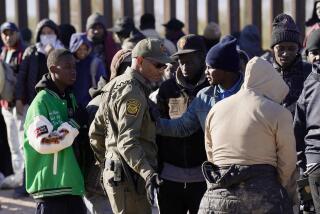Will Written and Duffel Bag Packed, a Reservist Waits
- Share via
On paper, John Richards is ready to go to war. Like others in his Van Nuys-based Army National Guard unit, he has made out a will. He gave his father legal authority over his business affairs. And he keeps a duffel bag packed with battle fatigues in his bedroom closet.
But as he waits for a call that may never come, the 40-year-old mortgage banker and Vietnam combat veteran questions whether the United States should fight in the Persian Gulf.
“As a member of the National Guard, I have a duty and a job to perform. But as a civilian . . . there are a lot of questions about our political and economic motivations that I’m not comfortable with,” said Richards, who works for a firm headquartered in Canoga Park.
As the United States prepares for possible war with Iraq, Richards and nearly 1,300 other California National Guard members attached to San Fernando Valley-based units await the possibility of being called to active duty--some in eager anticipation, others in anxiety and doubt.
In the meantime, they live with the uncertainty. They go to work each day. And play with their children. And follow the news like hawks for each new Persian Gulf development--all the while wondering if they will be spending Christmas at home or in a foreign desert.
In addition to the Guard units, there are several regular Army and Marine reserve units stationed in the Valley. Following Iraq’s Aug. 2 invasion of Kuwait, about 150 members of an Army reserve well-drilling unit based in Van Nuys were sent to the gulf. Sunday and today, 250 members of an Encino-based Marine combat reserve unit are also shipping out in support of the gulf operation.
Since the United States began building up its gulf military forces, only 1,230 of California’s 27,000 Army and Air Force National Guard members have been called up in support of Operation Desert Shield.
Most activated guard members--trained volunteers usually used in civil emergencies but available for wartime service--have been from Central and Northern California. Guard officials refuse to speculate on the chances of additional call-ups. So far, no Southern California guard units have been alerted that they may be called up.
While they wait, guard members have continued their usual weapons training and preparations for responding to chemical attacks. And officials are teaching them how to get their domestic affairs in order.
Guard members have been taught how to write wills and prepare powers of attorney, legal documents giving their relatives or friends the authority to buy and sell property or conduct other business while a reservist is away from home.
“It’s like Dr. Johnson said, ‘Knowing you’re going to be hanged within 24 hours focuses the mind wonderfully,’ ” said Sgt. Phil Jordan, a Sacramento-based National Guard spokesman, referring to Samuel Johnson, 18th-Century English writer and critic.
Some Valley-based reservists said the waiting bothers them only because they would rather be in the gulf.
“I’m looking forward to doing my job,” said Michael Shipman, 36, an Army National Guard warrant officer who works full time at a vehicle maintenance shop in Burbank.
“I may not get called for the rest of my career. This is my one shot at putting it in action and seeing if it actually works,” said Shipman, who volunteered for Vietnam as a teen-ager only to have his troop ship ordered home before it reached Southeast Asia.
“Our people are what you call pumped up. . . . Psychologically, our people are prepared for it,” said Ann Tait, a Southern California Edison accountant who is on leave to serve with the Air Force National Guard’s 261st Combat Communications Squadron in Van Nuys.
Others, however, regard a future call-up with dread.
“I’m not ready to fight this war. I think most of our motives are wrong,” said Richards, who 20 years ago served as an aerial spotter for artillery and B-52 bomber strikes in Vietnam’s infamous Demilitarized Zone.
He said the United States should not go to war for the sake of protecting oil companies and that if Iraq’s nuclear capability is to be destroyed, it should be done with air strikes, not ground troops.
Richards, of Carpinteria, said he re-enlisted in the National Guard 14 months ago because of the collapse of communism in Eastern Europe and the easing of Cold War tensions. The seeming outbreak of peace, he thought, made it unlikely the National Guard would ever again be sent into battle abroad.
But now, he said, “I’m back in the National Guard and I’m over 40 and I’m faced with going back and fighting a war that I still don’t have any vested interest in.”
More to Read
Sign up for Essential California
The most important California stories and recommendations in your inbox every morning.
You may occasionally receive promotional content from the Los Angeles Times.













